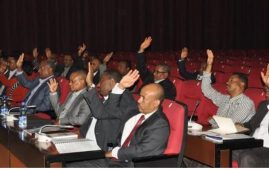The Ethiopian parliament approved a 117.8 billion Birr (US $6.8 Bln) budget for the 2011/12 fiscal year, which starts on mid-July.
About 71 per cent of the stated sum of budget will go to road, education, food security, health, capacity building and rural electrification programs, which were given priorities according to the five-year Growth and Transformation Plan. At least 17 Bln Birr is earmarked for road construction, 8.5 Bln for for education, and some 5.9 Bln Birr for Defense.
The budget showed an increase of 39% from the preceding fiscal year’s budget of 77.2 billion Birr and is said to be the largest in the country’s history.
Of the approved budget, about 76% per cent is to be covered from local sources.
Presenting the budget to the parliament, Prime Minister Meles Zenawi said that the country’s central bank had a lot of money in reserves. Thus, this ‘huge money reservoir’ will be reduced by 3.9 per cent to tackle the rising inflation. He pledged to stop borrowing money from the central bank to tackle inflation. Meles admitted that the collapse of treasury bond market forced the government to borrow more from domestic markets. ‘This was also our problem for the inflation….now, the government will stop borrowing from the bank and will stick to selling bonds,’ Meles said. He added, ‘this will help us to minimize the inflation, which has been rising since May.’
Meles promised to launch efforts to contain inflation and reduce it to the level of 3.9 per cent.
It is to be recalled that IMF suggested, at the end of its mission visit in Addis Ababa, on May 31:
The principal macroeconomic challenge is surging inflation, which reached 30 percent in April. While this partly reflects rising international commodity prices, excessive monetary growth has been the principal cause. Broad money has risen 35 percent at end March at the same time as rapid expansion of the central bank’s balance sheet (base money). The budget saw a domestic financing surplus in the first half of 2010/11, but there was significant recourse to central bank financing, as the Treasury bill market collapsed, reflecting highly negative interest rates.
However, the government had insisted so far that the main cause is imported inflation as a result of the global oil price hick. Yet, it is not clear how far the government concurs with IMF on the recommended measures, as the government is disinclined to slow down its investments in public infrastructure.





